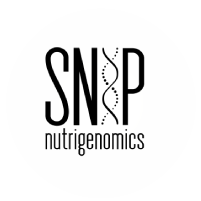If you’ve looked into genetics and DNA testing, you may have come across the term SNPs.
Among all of the other concepts that can seem overwhelming, you may have glossed over it, assuming it was another term too complex to learn. However, understanding how SNP DNA testing can help you overcome some of your genetic obstacles isn’t as difficult as it may sound.
SNPs are vital to actionable DNA test results. In fact, at SNiP Nutrigenomics, SNPs are what give us insight into what diets, exercises, and supplements will work best for your body. If you’re still learning about DNA testing, here’s what you need to know about SNP genetics so you can start taking action to become your healthiest self.
What’s a SNP?
SNP is an acronym for Single Nucleotide Polymorphism. SNPs can generate a different biological or metabolic recipe for each of us by a slight difference in ingredients which are known as nucleotides (A, T, C, or G). This slight difference is what makes us humans unique. Eye color, height, personalities, etc. are influenced by these individual genetic variations.
Researchers also evaluate these genetic variations to determine a less than optimal metabolic response in the body and how it functions, recovers and absorbs/utilizes nutrition and nutritional supplementation. Not all SNPs are problematic, but they do make us unique. There is a difference between observing SNPs for traits such as appearance or observing SNPs for health.
Are SNPs Harmful?
People typically talk about SNPs like they’re bad — but it’s really just a variation we need to understand so we can make better lifestyle choices.
For example, an SNP in a nutritional pathway can cause the body not to run properly, but nutrition and lifestyle can then exacerbate the issue. Essentially, SNPs load the gun and lifestyle pulls the trigger.
SNPs can prevent our bodies from running as efficiently as possible. But knowing about SNPs helps us make changes to help our bodies function more as they should.
SNP vs Mutation: What’s the Difference?
“Mutation” sounds worse, but essentially, SNPs and mutations describe the same genetic variation. Both SNPs and mutations refer to a difference in the nucleotides within our DNA.
A mutation typically refers to a change in observable traits or characteristics and can be seen in a single event or person.
A SNP “polymorphism” is observed in more than 1% of the population. They are the most common type of genetic variation.
How do SNPs Impact Nutrition?
SNPs affect how we absorb and utilize nutrients in the body. Many of these nutritional pathways precurse metabolic or cellular functions, meaning they influence energy production and cellular activity.
When we see a SNP in important nutritional pathways, we understand it can lead to certain types of health concerns. In many cases, we can take proactive steps to lead a healthy lifestyle. These are actionable SNPs that allow us to better support how our bodies function.
What Does SNiP’s DNA Test Look At?
At SNiP, our DNA testing follows a nutritional genomics approach. We analyze how nutrients and genetics interact and how that interaction impacts the way our bodies function.
As we pull and analyze SNPs, we follow nutritional pathways. We’re not just looking at genes that identify our physical traits. We want to find the genes we can take action on, and support based on your genetic code. It’s all about examining the nutritional pathways and understanding what we can support with nutrition and supplementation.
We then offer individualized nutritional supplementation, healthy diet and lifestyle recommendations based on your SNP genetics.
How Does SNiP Testing Differ From Other DNA Tests?
SNiP tests look for ways to offer proactive recommendations for health and wellness.
While many DNA tests provide interesting information, most of it isn’t actionable. Yet, SNiP goes beyond raw data. We convert your DNA data to a form we can analyze to understand what your body needs. Then, we provide top-quality support and supplementation to help fill in the gaps.
We’d all prefer for our bodies to naturally function just as they should. But they don’t. And the more you understand the SNPs that exist in your genetic code, the better you can choose a pathway to better health.
Have questions? Email info@snipnutrition.com and your inquiries may be featured in an upcoming post.

